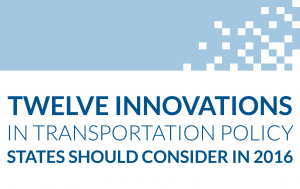How many states will try to do something different in 2016?
With Congress finally wrapping up their five-year transportation bill in late 2015, the spotlight will burn even brighter on states in 2016. With 40 state legislatures now in session and six more set to begin in the coming weeks, how many states will raise new funding? How many states will attempt to improve how they spend their transportation dollars? How many will take unfortunate steps backwards?
 As we highlighted in our most recent report that contained 12 recommendations for bringing state transportation policy out of the stone age, these state legislators will face the most critical of choices: continue pumping scarce dollars into a complex and opaque system designed to spend funds based more on politics than needs, or find a new approach that will boost state and local economies and restore taxpayer confidence in a broken system.
As we highlighted in our most recent report that contained 12 recommendations for bringing state transportation policy out of the stone age, these state legislators will face the most critical of choices: continue pumping scarce dollars into a complex and opaque system designed to spend funds based more on politics than needs, or find a new approach that will boost state and local economies and restore taxpayer confidence in a broken system.
Here’s a short roundup of some of the states and bills that we’ll be watching.
Increases in funding on the horizon?
Louisiana’s new governor, John Bel Edwards (D), and a new legislature have highlighted transportation as a priority issue. Edwards’ transition team recommended a big ramp up in spending for transportation projects — and especially on rail, transit, freight and other key, non-highway projects that have long been neglected. The transition team also recommended that — to make those projects possible — the state will need to move ahead on staffing and setting up the new office of multimodal commerce created by the legislature in 2014 as a way to reform the Department of Transportation and Development and broaden the state’s transportation focus. A special legislative session on the state budget begins in mid-February. Transportation is unlikely to be included in this session, but legislators will be laying the groundwork for raising new funding in a later session or next year.
Following years of unsuccessful efforts, Missouri’s legislature is again looking for ways to raise new state revenue for transportation. A voter initiative in 2014 was defeated in part because it would have taxed metropolitan areas most heavily but not given cities the autonomy to spend these funds on their most pressing transportation needs. To get support for new funding — several bills have been introduced already this year — legislators will likely need to reform the way funds are distributed and spent, but few reforms have been offered.
A special transportation finance panel called by Connecticut Gov. Dannel Malloy (D) recommended multiple sources of financing to fund the state’s long list of repair needs and planned projects. But it called for the state to first implement several reforms, including setting aside fuel tax and toll revenues exclusively for transportation projects and for enabling new local or regional funding options to allow alternative funding for local priorities.
Colorado’s legislature is fielding a slew of calls for new ways to get more money to transportation projects. Gov. John Hickenlooper (D) has called for a tax swap that would allow the state to spend existing revenue on transportation projects. Some transportation advocates have called for general obligation bonds, shifting money now used for road repair to pay for new projects, or a statewide ballot measure to increase revenue for transportation.
After months of publicly calling for state legislators to boost state transportation funding and barnstorming the state to make his case, Tennessee Gov. Bill Haslam (R) has pushed the issue off the agenda until 2017. The call for new revenue got a chilly reception with state legislators, including leaders in Haslam’s own party. Fortunately, as we highlight in our report from two weeks ago, Tennessee’s DOT is already a leader in finding cost-effective solutions and saving state money by right-sizing their projects — keys to building trust and ensuring voters that any new money down the road will be well-spent.
New local funding
Local communities want and need to put their own skin in the game, and states should enable them to do so. Far too many states restrict the ability for locals to tax themselves to raise their own funds for transportation, but scores of other states are looking for ways to enable local communities to raise their own dollars for their most pressing needs.
A bill was introduced in Massachusetts by START Network member Rep. Chris Walsh (D-Framingham) to allow cities and towns to impose a payroll, sales, property, or vehicle excise tax to fund local transportation projects, including repair and new construction of streets, bridges, transit, and pedestrian or bike infrastructure. A bill in Wisconsin allows counties or municipalities to impose a temporary, 0.5-percent sales tax to raise money exclusively for street and highway repair. Both bills would require the new taxes to be approved by the local government and a voter referendum.
A 2013 transportation funding bill in Virginia added extra fuel and sales taxes for the state’s most populous urban regions of Northern Virginia and Hampton Roads to help them meet the large, complicated transportation demands. Two bills introduced this year add a new floor to the local supplemental tax equal to the amount that would have been charged in February 2013, already in place for the statewide wholesale rate, and increase the wholesale rate for the Hampton Roads region from 2.1-percent to 5.3-percent.
Measuring performance
Last month, Virginia Department of Transportation released its first list of projects scored and ranked to receive funding in the Statewide Transportation Improvement Program. This program is the result of a dogged focus by legislative leaders and the administration of Gov. Terry McAuliffe (D) to reform the state’s transportation program. START members and other local leaders have had positive feedback thus far for the new system intended to increase transparency and public understanding of transportation investments by objectively screening and scoring transportation projects based on their anticipated benefits.
Massachusetts is in the midst of implementing a similar program that was created as part of the 2013 transportation funding package.
Moving backward
While legislators in many states are looking for ways to meet diverse transportation needs, some legislators are leading efforts to entrench systems that fund highways only. A bill passed out of Colorado’s Senate Transportation committee would eliminate $15 million in state money directed to transit from a 2009 funding bill. A bill in Tennessee would limit state transportation funds, including those distributed to cities and counties, exclusively for highways and bridges.



















